Meet the Candidates: These are the nominees for future ABA leadership positions
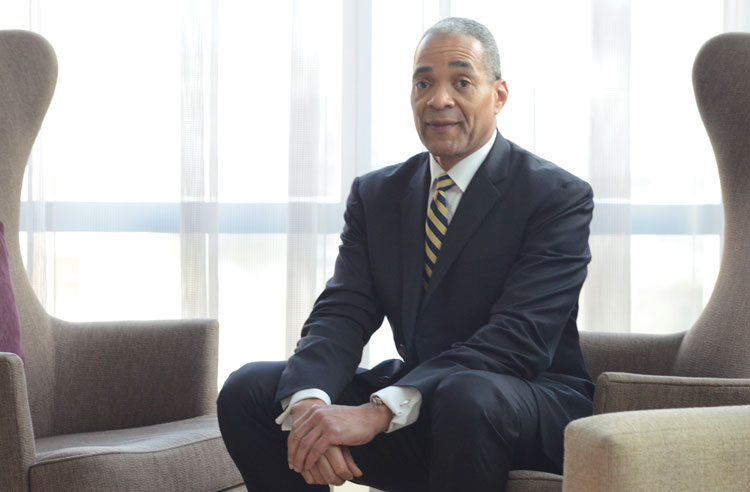
Photo of ABA President-Elect Nominee Reginald Turner by Danny Duran
We asked all of the candidates for leadership positions the same five questions: Why did you decide to serve the ABA in this new role? What would you like to accomplish during your term in office? Why did you become a member of the association and what changes have you seen since you joined? And finally, what positive experiences have you had with the association?
Reginald M. Turner
President-Elect Nominee
Executive committee member of Clark Hill in Detroit. Member of the House of Delegates since 2008. Chair of the Rules and Calendar Committee (2016-2018) and vice-chair of the Committee on Issues of Concern to the Legal Profession (2010-2012) and Steering Committee of the Nominating Committee (2009-2010). Vice-chair of the Section of Civil Rights and Social Justice Education Committee. Chair of the Commission on Racial and Ethnic Diversity in the Profession (2011-2014) and Commission on the Lawyer’s Role in Assuring Every Child’s Right to a High-Quality Education (2016-2017). President of the National Bar Association (2005-2006) and State Bar of Michigan (2002-2003). Chair of the Fellows of the American Bar Foundation (2018-2019). Received JD in 1987 from University of Michigan Law School.
Reason to serve: “I had a number of mentors who suggested that I consider seeking more responsibility over time. I can truthfully say that, at least for the past 10 years, I have had really great relationships with our presidents of the American Bar Association. There are so many past presidents who have taken time to sit down with me, talk with me and encourage me with my work at the American Bar Association. They have been shining examples of the best in our profession.”
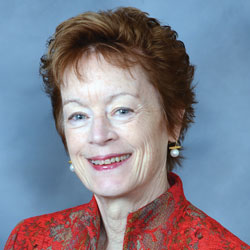
Photo by Danny Duran
Barbara J. Howard
House of Delegates Chair-Elect
Principal at Barbara J. Howard Co. in Cincinnati. Member of the House of Delegates since 1986. Chair of the Committee on Issues of Concern to the Legal Profession (2008-2010), Select Committee (2000-2002) and Committee on Credentials and Admissions (1994-1996). Chair of the Standing Committee on Specialization. Chair of the Standing Committee on Meetings and Travel (2014-2017) and Standing Committee on Membership (2011-2013). Member of the ABA Journal Board of Editors (2005-2011) and president of the Young Lawyers Division Fellows (2008-2009). President of the Ohio State Bar Association (2009-2010) and Cincinnati Bar Association (2001-2002). Fellow of the American Bar Foundation. Received JD in 1979 from University of Cincinnati College of Law.
Changes in the association: “The whole world has changed. We’ve been through how many recessions, and who knows what’s going to happen with the coronavirus? I have seen the ABA go through lots of ups and downs. I have seen the organization take on some really important issues, both on the domestic front and international front; certainly, we have dealt with the issue of immigration. I have witnessed how we, as an association, have evolved over time to meet more of our members’ and potential members’ needs. It is important that we continue to evolve in a positive way.”
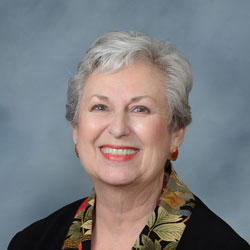
Photo by Danny Duran
Pauline A. Weaver
Secretary-Elect
Owner of the Law Office of Pauline A. Weaver in Fremont, California. Member of the Board of Governors (2003-2006) and Section Officers Conference liaison to Profession, Public Service and Diversity Committee (2017-2019). Member of the House of Delegates (1990-2020). Chair of the Government and Public Sector Lawyers Division (2016-2017) and member of the Solo, Small Firm and General Practice Division Council (2002-2003). Chair of Law Day (2013-2014) and Death Penalty Representation Project (2006-2009). President of the National Conference of Women’s Bar Associations (1989-1990) and California Women Lawyers (1986-1987). Patron fellow of the American Bar Foundation. Received JD in 1979 from University of Memphis Cecil C. Humphreys School of Law.
Plans for term: “I would like to make the office of secretary more accessible. As I have said to everyone, I intend to remain available if they have problems, questions, comments, complaints or suggestions. Most people just see the secretary saying ‘second’ every time a motion is made, but it’s a whole lot more than that. I hope to do some education with the ABA general membership on what the secretary is and what the secretary does, to make myself more accessible to people in the House and those who serve on the committees of the association.”
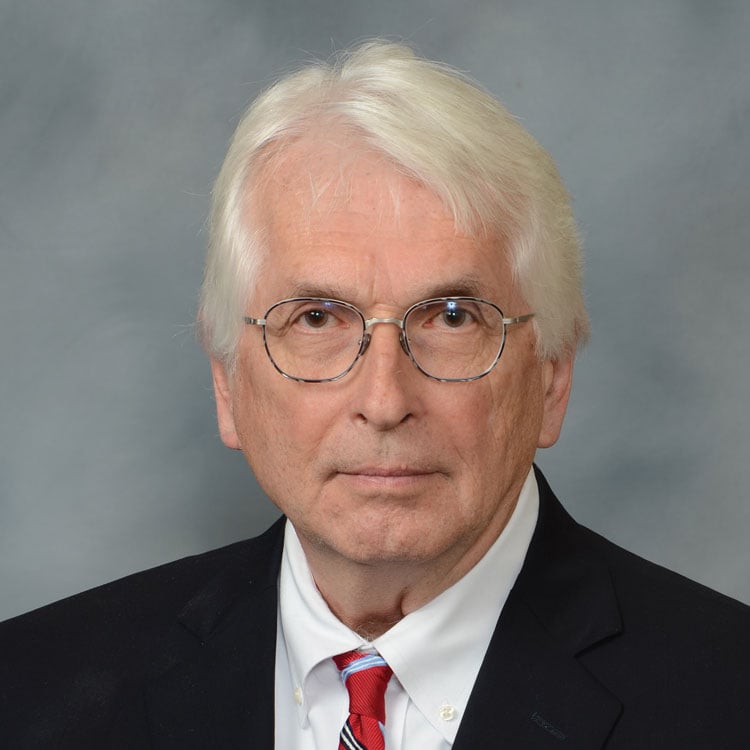
Photo by Danny Duran
Russell F. Hilliard
District 1
Attorney at Upton & Hatfield in Portsmouth, New Hampshire. Member of the House of Delegates since 2006. President of the New Hampshire Bar Association (2003-2004), member of its Board of Governors (1979-1981) and its Legislative Counsel (1979-1983). Chair of the New Hampshire Bar Foundation in 2008. President of the New England Bar Association (2012-2013) and Merrimack County Bar Association (1978-1979). Fellow of the American College of Trial Lawyers since 1995. Received JD in 1976 from Cornell Law School.
Positive experience with the ABA: “I’ve had the ability to get to know people from all areas of the country and appreciate their diverse challenges in the practice of law—challenges in the profession that might be different than they are in New Hampshire. The other thing I will say, and I have said this so many times: I enjoy being active in the ABA, the New England Bar Association and the New Hampshire Bar Association because I find that those who devote time to professional organizations are people who are much happier with their profession and their work.”

Photo by Danny Duran
Kevin J. Curtin
District 2
Senior appellate counsel in the Middlesex County District Attorney’s Office in Woburn, Massachusetts. Member of the House of Delegates since 2018, serving currently on the Committee on Drafting Policies and Procedures. Vice-chair at large of the Criminal Justice Section Council and co-chair of the Appellate and Habeas Practice Committee, Immigration Committee and Specialized Practice Division. Member of the Working Group on Building Public Trust in the American Justice System and chair of the International Law Section Working Group on Turkey. Received JD in 1988 from Boston College Law School.
Reason to serve: “I thought it was an opportunity for me to serve the ABA in a different way that would allow me to become intimately familiar with the operations and functioning of the association. I have something to offer, as I have an unusual background as a state prosecutor with a focus on state law issues. I have also been active in our state bar association, so that’s one of my interests—to see the ways in which we can reach out as an association to our state bar associations and work with them.”
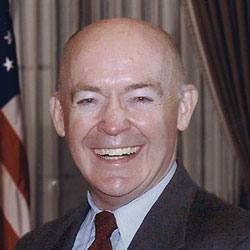
Courtesy of John C. Cruden
John C. Cruden
District 4
Principal at Beveridge & Diamond in Washington, D.C. Prior to private practice, served with the U.S. Department of Justice Environment and Natural Resources Division, including as assistant attorney general, and in the U.S. Army Airborne, Ranger and Special Forces units and as a judge advocate. Chair of the Section of Environment, Energy and Resources (2009-2010). President of the District of Columbia Bar (2005-2006), American College of Environmental Lawyers (2016-2017) and Environmental Law Institute (2011-2014). Graduated from U.S. Military Academy at West Point in 1968 and received JD in 1974 from Santa Clara University School of Law.
Changes in the association: “One change is that law firms are not routinely paying for ABA membership as they used to. Fortunately, my law firm does do that. I also see another change: What the ABA is doing nationally has become more important during times where we have clear divide in our government, and it’s harder for the government to do things. Having a bipartisan organization that is making pronouncements on policy and procedures and the rule of law has become more important rather than less important because government itself is struggling.”
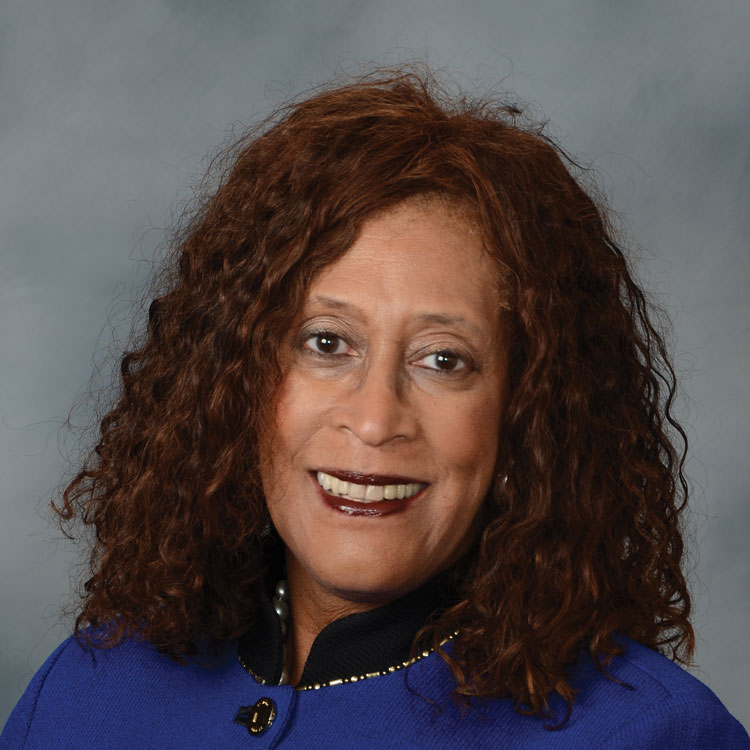
Photo by Danny Duran
Pamila J. Brown
District 6
Administrative judge in the Howard County District Court in Ellicott City, Maryland. Member of the House of Delegates since 2001 and chair of the Select Committee. Chair of the Standing Committee on Bar Activities and Services. Member of the National Conference of Specialized Court Judges Executive Committee. Chair of the Commission on Domestic & Sexual Violence (2007-2010) and Government and Public Sector Lawyers Division (1993-1994). President of the Maryland State Bar Association (2015-2016) and Bar Association of Baltimore City (1997-1998). Received JD in 1979 from University of Baltimore School of Law.
Positive experience with the ABA: “My young lawyer experience was that it was a melting pot of innovative and creative ideas with a bent toward making the world a better place through all of the pro bono and civic outreach efforts. That laid the groundwork for my continued activities: being engaged in the community and trying to make a difference one day at a time, one meeting at a time and reaching out to one person at a time. As a more senior person, it is a sense of pride for me to see the association and how it has made its mark with respect to legislation and being a voice of reason dealing with really critical issues facing the legal profession.”
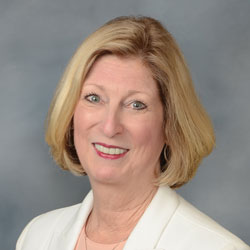
Photo by Danny Duran
Linda S. Parks
District 12
Managing partner of Hite, Fanning & Honeyman in Wichita, Kansas. Member of the House of Delegates (1999-2005 and 2009-present) and member of the Select Committee. Member of the Steering Committee for the Nominating Committee (2016-2018). Member of the Commission on Homelessness and Poverty (2016-2019) and Commission on Mental and Physical Disability Law (2000-2003). President of the Kansas Bar Association (2007-2008) and founding member and first president of the Kansas Women Attorneys Association (1994-1996). Life fellow of the American Bar Foundation. Received JD in 1983 from Washburn University School of Law.
Plans for term: “I would like to be a person who helps the association flourish and grow. I would like to be able to educate people, particularly in Kansas, about the many things the organization does to help the profession. I don’t think that’s any particular task. It’s an ongoing obligation of all of us, and if I can help in some larger way, I would sure like to get that done.”
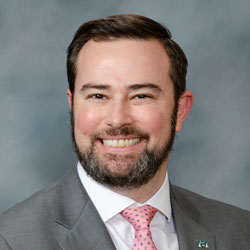
Photo by Danny Duran
Andrew M. Schpak
District 19
Co-managing partner of Barran Liebman in Portland, Oregon. Member of the House of Delegates since 2010 and reporter of the Select Committee. Vice-chair of the Judicial Division Lawyers Conference. Member of the Law Practice Division Council and vice-chair of its Outreach Committee. Member of the Standing Committee on Bar Activities and Services. Chair of the Young Lawyers Division (2014-2015). President of the Multnomah Bar Association (2017-2018) and its Young Lawyers Section (2008-2009). American Bar Foundation board member, life fellow and co-chair of the Oregon Fellows. Received JD in 2004 from Cornell Law School.
Plans for term: “My hope during my term is that I can bring a helpful perspective to the conversation. Being a Board of Governors member doesn’t mean you come in with an agenda. It’s more about recognizing that, for instance, we’re probably going to deal with the impact of COVID-19 on budgets, entities, as well as the association as a whole. It’s trying to strike a balance between looking at what we’ve done in the past while trying to be innovative in what we need to do in order to maintain relevance and make it through the storms that might come.”
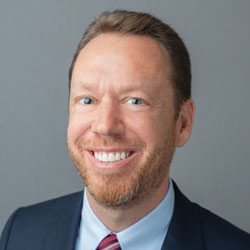
Photo by Nashville Corporate Photography
Lucian E. Dervan
Criminal Justice Section
Law professor and director of criminal justice studies at Belmont University College of Law in Nashville, Tennessee. Chair of the Commission on the American Jury. Immediate-past chair of the Criminal Justice Section and member of the Executive Committee. Co-chair of its Plea Bargaining Task Force, founder and chair of the Global White Collar Crime Institute and member of the Book Board. Member of the American Bar Foundation. Received JD in 2002 from Emory University School of Law.
Reason to serve: “I really enjoyed the opportunity to be in the leadership of the Criminal Justice Section and learn so much about the day-to-day work that makes that such a successful section. As I moved out of that position and had the opportunity to take a role with the Commission on the American Jury, I was able to see so many of the different things the association is engaged in. It seemed like the next natural step to try to move into a position where I have an opportunity to contribute to and work on some of the issues that affect the entire association.”

Photo by Danny Duran
Sheila Slocum Hollis
Section of Environment, Energy, and Resources
Founding managing partner and of counsel at Duane Morris in Washington, D.C., and former member of the firm’s executive committee. Former director of the Federal Energy Regulatory Commission Office of Enforcement. Member of the House of Delegates since 1995. Chair of the Standing Committee on the Law Library of Congress and vice-chair of the Senior Lawyers Division. Chair of the Section of Environment, Energy, and Resources (2000-2001); Standing Committee on Environmental Law (1997-2000); ABA Journal Board of Editors (2007-2010); Fund for Justice and Education Council (2006-2009) and Standing Committee on Gavel Awards (2009-2012). First female president of the Energy Bar Association (1991-1992). Received JD in 1973 from University of Denver Sturm College of Law.
Positive experience with the ABA: “I’ve been at it for so many years. I’ve had good experiences on the international front and the opportunity to participate, speak and meet other people involved in areas that I was terribly interested in, many times cutting-edge national and international issues. It has enhanced my relationships, my practice, my friendships and my family’s life. It opened up different opportunities in different parts of the world and expanded the horizons tremendously.”
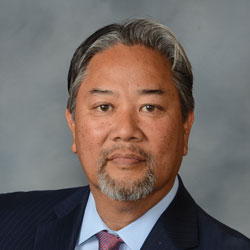
Photo by Danny Duran
Koji F. Fukumura
Section of Litigation
Partner and management committee member at Cooley in San Diego. Member of the Standing Committee on the Federal Judiciary and Commission on the American Jury. Chair of the Section of Litigation (2017-2018). Member of the Standing Committee on Technology and Information Systems (2014-2016) and Standing Committee on Strategic Communications (2006-2008). Member of the Lawyers’ Committee for Civil Rights Under Law Board of Directors. National Asian Pacific American Bar Association Executive Committee member (2005) and regional governor (2001-2004). Received JD in 1993 from Temple University Beasley School of Law.
Reason to serve: “We’ve taken steps that I think and hope will stabilize membership and increase membership. We’re at a really critical time right now in making sure the steps that we take are going to reengage with lawyers in the United States and really capture the sustained loyalty of younger lawyers so they can understand the benefits and the importance of membership. And in the last couple of years, we have seen the ABA lead on important issues like the rule of law and attacks on the judiciary, and on access to justice at a time when funding for legal services organizations and other organizations that serve vulnerable populations are being cut at the local, state and federal levels. We need to continue to be a strong national voice on these important issues.”
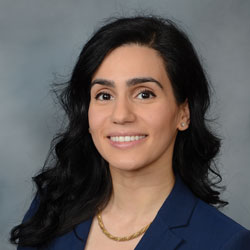
Photo by Danny Duran
Shayda Z. Le
Young Lawyers Division
Partner at Barran Liebman in Portland, Oregon. Member of the Young Lawyers Division Executive Committee. Member of the Legal Opportunity Scholarship Fundraising Committee. Immediate-past president of the Multnomah Bar Association Young Lawyers Section. Member of the Campaign for Equal Justice Advisory Committee. Fellow of the American Bar Foundation. President of the Andisheh Center (2017-2018). Received JD in 2011 from Boston University School of Law.
Positive experience with the ABA: “I am on the Legal Opportunity Scholarship Fundraising Committee, which raises money to provide diversity-related scholarships to students in law school. I was appointed to that committee even though I didn’t apply for it, and I’m still doing it even though that year has passed. I found that became a platform to not just encourage other people to be giving toward the association but elevated my own perspective about what the ABA does. Giving money to diverse and deserving law students is one of the most outwardly impactful things that the ABA does for people who are not already association members. It changes the life of a law student potentially or provides them a trajectory where they can go into service or make contributions.”
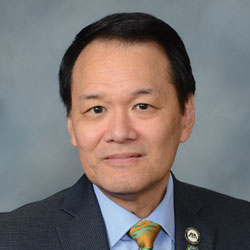
Photo by Danny Duran
Marvin S. C. Dang
Goal III Minority Member-at-Large
Managing member of the Law Offices of Marvin S. C. Dang in Honolulu. Former member of the Hawaii House of Representatives. Member of the House of Delegates since 2018. Immediate-past chair of the Senior Lawyers Division; vice-chair of the Diversity & Inclusion Committee; and liaison to the Commission on Racial and Ethnic Diversity in the Profession, Commission on Sexual Orientation and Gender Identity, and Diversity and Inclusion Advisory Council. Member of the Fund for Justice and Education. Former member-at-large of the Solo, Small Firm and General Practice Division Council. Member of the National Asian Pacific American Bar Association-Hawaii Board of Directors. Received JD in 1978 from George Washington University Law School.
Plans for term: “When I was chair of the Senior Lawyers Division, I used the acronym ‘WISE.’ That is what I would like to use as my goal for service on the board. The ‘W’ stands for well-being, and that involves the financial well-being of the ABA and also the physical, financial and mental well-being of our members. ‘I’ is innovative. We need as an organization to think outside of the box as we plan and implement programs and projects. ‘S’ is service. The ABA needs to be of service to our members. We need to make sure that our members receive benefits and value. And ‘E’ is experience. We are fortunate to have many experienced attorneys, and it’s important for them to share their knowledge with other ABA members.”
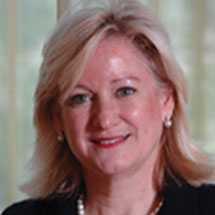
Photo courtesy of Vickie Yates Brown Glisson
Vickie Yates Brown Glisson
Goal III Woman Member-at-Large
President of VYBG Consulting in Louisville, Kentucky. Former candidate for Congress in 2018 and secretary of the Kentucky Cabinet for Health and Family Services (2015-2018). Member of the Youth at Risk Advisory Commission since 2017. Chair of the Health Law Section (2008-2009). Received JD in 1979 from the University of Kentucky J. David Rosenberg College of Law.
Plans for term: “There are initiatives that I want to help support that are within the Diversity and Inclusion Center. The Grit Project, for instance, is a wonderful initiative. I live on a farm, where you better be gritty and have the mindset that you are tenacious and will rise to the occasion. So many times, women have not been called upon to dig down into themselves. I am that representative for women, and I want to be able to represent their interests and continue the growth we see in diversity and acceptance. I also want to work with the other Goal III entities to help them have that inclusion and diversity.”



